Here’s some demographic data to chew on. Go ahead and mull it over for a while. What conclusions can we draw from it?
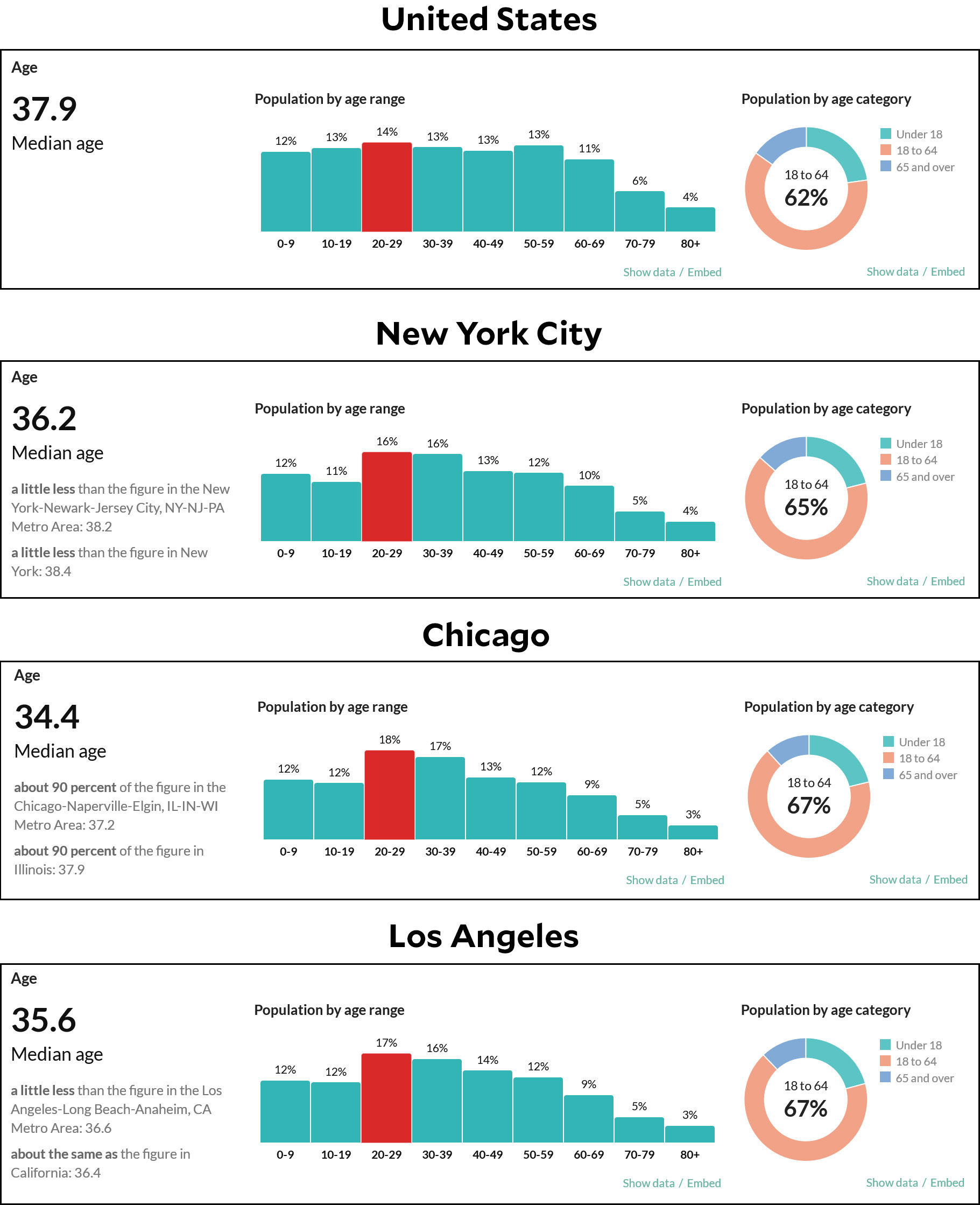

Here’s some demographic data to chew on. Go ahead and mull it over for a while. What conclusions can we draw from it?

I’ve been playing around with pictures of the night sky lately, and as you can imagine I’ve had varying success here among the bright lights of Orange County. The best I can do locally is out around Silverado Canyon, which is only a so-so viewing spot. But it’s good enough to let me figure out how best to set up the camera for future efforts.
I took these photos last night, which is the last moonless night for a while. The top photo is just an ordinary exposure, with the the Big Dipper highlighted. Polaris is right in the bend of the tree, so it was a good angle. Once all that was done, I set the shutter on Bulb and let the camera sit there for a while in order to get a nice photo of star trails.
I had planned to let it go for three or four hours, and I even brought along a Mophie battery pack so my camera could last that long. But after about an hour or so, clouds rolled in and I packed up. The Clear Sky Chart for Irvine had indicated that the cloud cover would change between midnight and one, but the change it showed was so abrupt that I didn’t really believe it. However, it turned out to be almost spookily accurate, and when I woke up this morning there was actual water falling from the sky.
Still, the result wasn’t too bad. I don’t think I’ll ever be able to do much better than this around here, but sometime in the next month or two I think Marian and I might take a short vacation to some nice, dark spots out in the desert. We just haven’t figured out which desert yet.



Sure, she looks happy now. But what if her purchase gets declined?Image Source/ZUMAPRESS
The Wall Street Journal tells us today about Riskified, a company that scores consumer behavior and then decides whether to approve or deny purchases. It’s used mostly for online purchases, by big and small sellers alike:
Michael Green, 50 years old, found out about one of the firms by accident. He ordered headphones online for his son’s 18th birthday. Days later, when he hadn’t heard anything about the order, he contacted the headphone brand, Audeze, which told him the purchase had been canceled because a third-party firm had determined he was a fraud risk. Mr. Green noticed that the status of his order said “Riskified Rejected.” When he emailed Riskified to ask why he had come up as a fraud risk, a customer service agent told him the company had no further information. “There was no explanation, no appeal,” said Mr. Green, a financial professional in Austin, Texas.
But wait!
After The Wall Street Journal contacted Riskified, CEO Eido Gal said Mr. Green’s order was incorrectly declined. “Riskified tends to be far more accurate and efficient than traditional fraud-prevention methods, but no solution is perfect, and we’re still improving,” he said.
There are two big problems here. First, there’s the usual “fuck you” attitude that all these companies have unless a reporter calls them up. Mr. Green was up the creek for no reason he could determine, and Riskified refused to bother looking into it until the Wall Street Journal contacted them. Suddenly, it turned out Green was “incorrectly declined.” How about that?
The second big problem is that no one knows what goes into these algorithms that check consumer behavior. For example, did you know that a third of all people named Green are black? Did that have any effect on things? There’s no telling, since Riskified’s algorithms are proprietary and they won’t tell us. What’s more, it’s even possible that this little factoid had an effect without Riskified even knowing it.
Welcome to the 21st century. It’ll all work out eventually, I suppose, but it’s sure a huge pain in the ass—or worse—while we wait.

Joan Cros/NurPhoto via ZUMA
From Fran Taylor, a San Francisco resident who attended a hearing about electric scooters in the city:
I think the scooters run amok are actually a plot of the young people to kill off all us old farts so they can have our rent-controlled apartments.
Is that a joke? I guess so, but in a funny-cause-it’s-true sort of way. In any case, apparently scooters are like Uber, but for scooters. Literally:
Some of the scooter start-ups haven’t exactly been asking for permission. Bird, which has raised $115 million from venture capitalists, was founded by former Uber executive Travis VanderZanden….“It is clear that many of these companies continue to build their corporate empires off a basic premise: making massive profit always trumps protecting the public, and innovation is only possible by cutting corners,” said Aaron Peskin, a city supervisor. “It would be very nice if the tech bros could come in and ask for permission instead of asking for forgiveness,” he said.
Cities need to wise up. Uber performed a massive proof-of-concept that it is, in fact, better to beg for forgiveness than to ask for permission. If cities want to nip this in the bud, they’re going to have to get tough: send out a truck to round up all the scooters and then pulp them. Eventually the tech bros will get the message that they need to ask for permission just like everyone else.

This is every American city dweller's nightmare.SIPA Asia via ZUMA
Jonathan Chait wrote a piece yesterday titled “The Urban Housing Crisis Is a Test for Progressive Politics”:
You can dive in to the details if you want, but the bottom-line conclusion is quite simple: Housing is too expensive in many cities because there isn’t enough of it. There isn’t enough of it because zoning and other regulations prevent the construction of high-density housing….Expanding the supply of housing allows people to move in to cities without displacing existing residents. The simple Econ 101 model of supply and demand does not solve every problem, but it does solve this one.
Why don’t we do it?…Even where activists have managed to broaden the question — like in California, where they brought a bill to the state level — it turns out that progressives are susceptible to NIMBYist rhetoric. Allowing the construction of more multifamily housing means relaxing — gasp — regulations. And it means working with — gasp — developers….The controversy in California and other Democratic-dominated areas has been heavily infused with instinctive support for existing regulation, and distrust of business as a malignant force….It is also a political test for whether progressives will be manipulated by knee-jerk suspicions, or be able to think clearly about using the market to serve human needs.
I feel the need to push back. Chait is right that development is primarily a local issue, and also right that most local government in large cities is Democratic. But this isn’t really a partisan issue. As he acknowledges, the problem is that city dwellers almost unanimously don’t want lots of dense new development, and whoever is in power will get thrown out pretty quickly if they do things that most of their constituents hate. Calling this a test for progressive politics is almost certainly wrong on this level.
It’s also wrong on several other levels:
Beyond all this, I’m not convinced that making our big cities bigger is even a good idea. Why should we? There are benefits to urbanization, but there also limits to economies of scale. Should New York have 20 million people? Should LA have 10 million? Why? Wouldn’t it be a better idea instead for, say, Pittsburgh to have a million people? Or Nashville? Or Little Rock? We’d be a lot better off with a few dozen more cities of a million or two million than half a dozen behemoths of 10 million.
Now, these cities might not want to grow either. Different cities have different priorities. But there are plenty of cities that do want to grow, so why not focus on them instead of trying to force unpopular ideas on a small number of our already biggest cities? This is a long-term problem no matter which way you slice it, but I’ll bet that if progressives started putting their efforts into making biggish mid-size cities into smallish big cities, they’d have a lot more luck. It would be a winning formula on a whole bunch of different levels.
¹Which is not to say that lots of people don’t distrust developers. They tend to be a pretty unsympathetic lot.
UPDATE: This isn’t really a core part of my argument, but it appears that New York was relatively affordable up through the 50s, and then took off after that. Apologies for the error. However, it’s expensive today despite pretty high density and pretty good mass transit.
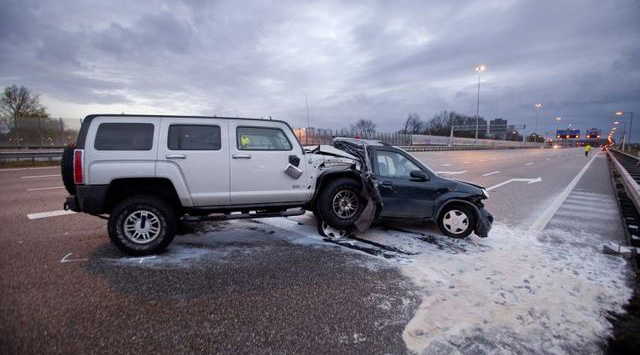
Take that, you gas-sipping Japanese tin can.
From the LA Times this morning:
The Trump administration is embracing a curious — and some would say dated — argument as it builds its case to weaken federal rules championed by California that require cars and SUVs to average 55 miles per gallon by 2025. It is warning that the fuel-efficiency targets, seen by most as key to meeting climate and air quality goals in California and nationwide, could actually end up killing people.
….The agency is preparing to make the case that tough fuel economy rules could effectively force automakers to sell smaller, lighter and thus less crash-worthy vehicles. That, in turn, would lead to more crash-related deaths. And it warns the rules could drive up the cost of cars to the point that consumers will put off buying new, safer models equipped with life-saving technology improvements.
This is only a “curious” argument if you don’t understand its audience. The aim here is not to build a case for the process of repealing the Obama fuel-economy rules. The aim is to appeal to Trump’s base, which has long held this theory to be gospel truth. When I’m on the road, I want a couple of tons of metal between me and the rest of the idiots.
The kernel of truth here is that all else being equal, if a big car smashes into a little car, the big car will take less damage. However, as long as cars are, on average, all getting bigger or smaller at the same time, there’s no change in overall safety.
But that doesn’t matter. The Trump base will slam down its beer and say it’s about time someone gets it. The usual suspects will write op-eds making the case that Trump’s EPA is right. John Lott will whip up a statistical study to prove that fuel economy kills. David Roberts will write 5,000 words at Vox explaining why Lott is wrong. And then the whole thing will be forgotten.
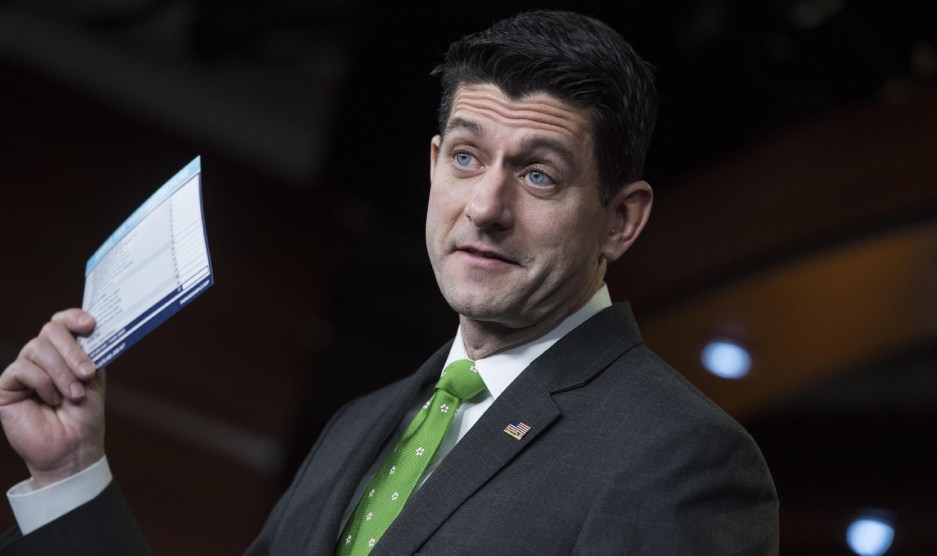
Yes, Paul Ryan is still droning on about his tax return on a postcard. And yes, it's the same one that includes a 100-page asterisk where you do your actual taxes.Tom Williams/Congressional Quarterly/Newscom via ZUMA
The Washington Post reports that the Republican tax cut hasn’t been a big hit with the public: “A Wall Street Journal and NBC News poll published this week found that 27 percent of respondents thought the tax law was a good idea, while 36 percent said it was a bad idea.”
Bummer. So what’s the Republican plan to get the public back on its side?
House Speaker Paul D. Ryan (R-Wis.) aims to pass another massive tax cut this summer, which Republicans hope will rev up the GOP base and improve the standing of Republicans at the polls….Conservative leaders met with Ryan on Monday and expect a vote in June or July. That would give lawmakers time to discuss the issue with constituents over the August recess and ahead of Labor Day, the traditional kickoff to the election campaign season.
Of course that’s the plan. The answer to every problem always and everywhere is a tax cut.
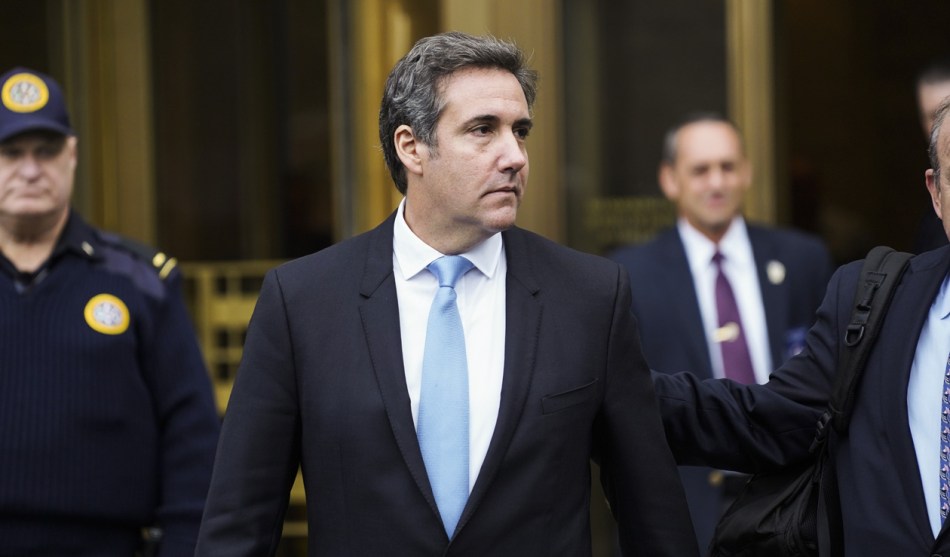
Go Nakamura via ZUMA
This is a helluva strange story from the Wall Street Journal:
One of President Donald Trump’s longtime legal advisers said he warned the president in a phone call Friday that Michael Cohen, Mr. Trump’s personal lawyer and close friend, would turn against the president and cooperate with federal prosecutors if faced with criminal charges.
Mr. Trump made the call seeking advice from Jay Goldberg, who represented Mr. Trump in the 1990s and early 2000s. Mr. Goldberg said he cautioned the president not to trust Mr. Cohen. On a scale of 100 to 1, where 100 is fully protecting the president, Mr. Cohen “isn’t even a 1,” he said he told Mr. Trump….“Michael will never stand up [for you]” if charged by the government, Mr. Goldberg said he cautioned the president.
….Mr. Goldberg provided fresh details about the search warrants executed against Mr. Cohen, which he said came from a conversation in recent days with Mr. Trump’s lawyer, Ty Cobb. Mr. Cohen faces scrutiny over his payment to the former adult-movie star Stephanie Clifford for her silence, as well as his taxi business, according to people familiar with the matter.
Put aside the question of whether any of this is true. It doesn’t matter. The real question is why Jay Goldberg repeatedly, and in vivid terms, told a national newspaper that (a) Cohen was unreliable, (b) he had reported this to Trump, and (c) Trump apparently didn’t push back. This isn’t the kind of conversation that would normally elicit anything more than a terse “no comment,” but Goldberg provided the Journal with a two-hour interview.
This is not an accident. Nor is Goldberg just a guy who doesn’t know how to keep his mouth shut. He’s a skilled and famous lawyer who’s, um, associated with mob figures like Matty “The Horse” Ianniello, Joe “Scarface” Agone, and Vincent “Jimmy Blue Eyes,” and who once described himself to a gossip columnist as a ‘‘killer’’ who could ‘‘rip skin off a body.’’
So why did Goldberg do this? And why did the White House not push back against the story? Was there some reason that all parties involved wanted to make sure that this opinion of Cohen was made very, very public?
Tyler Cowen: “Kim [Jong Un] is only human and has to be thinking some about his own life. Does he want 40 or more years of lining up officials and executing them?”
Larry Summers: “My experience with crises is that they are never resolved until the authorities have made a forecast that proves too pessimistic.”
Barack Obama: “For instance, they could have me say things like, I don’t know…President Trump is a total and complete dipshit. Now, you see, I would never say these things—at least not in a public address.”
Donald Trump: “James Comey, the worst FBI Director in history, was not fired because of the phony Russia investigation”
Donald Trump: “In fact, when I decided to do it, I said to myself, I said, you know, this Russia thing with Trump and Russia is just a made-up story. It’s an excuse by the Democrats for having lost an election that they should have won.”
Mitchell Stein: “I think we need t-shirts: ‘Hey conservatives! You can totally be for national health care but continue to be a dick about it and everything else!’ Thanks @kdrum” You’re welcome:
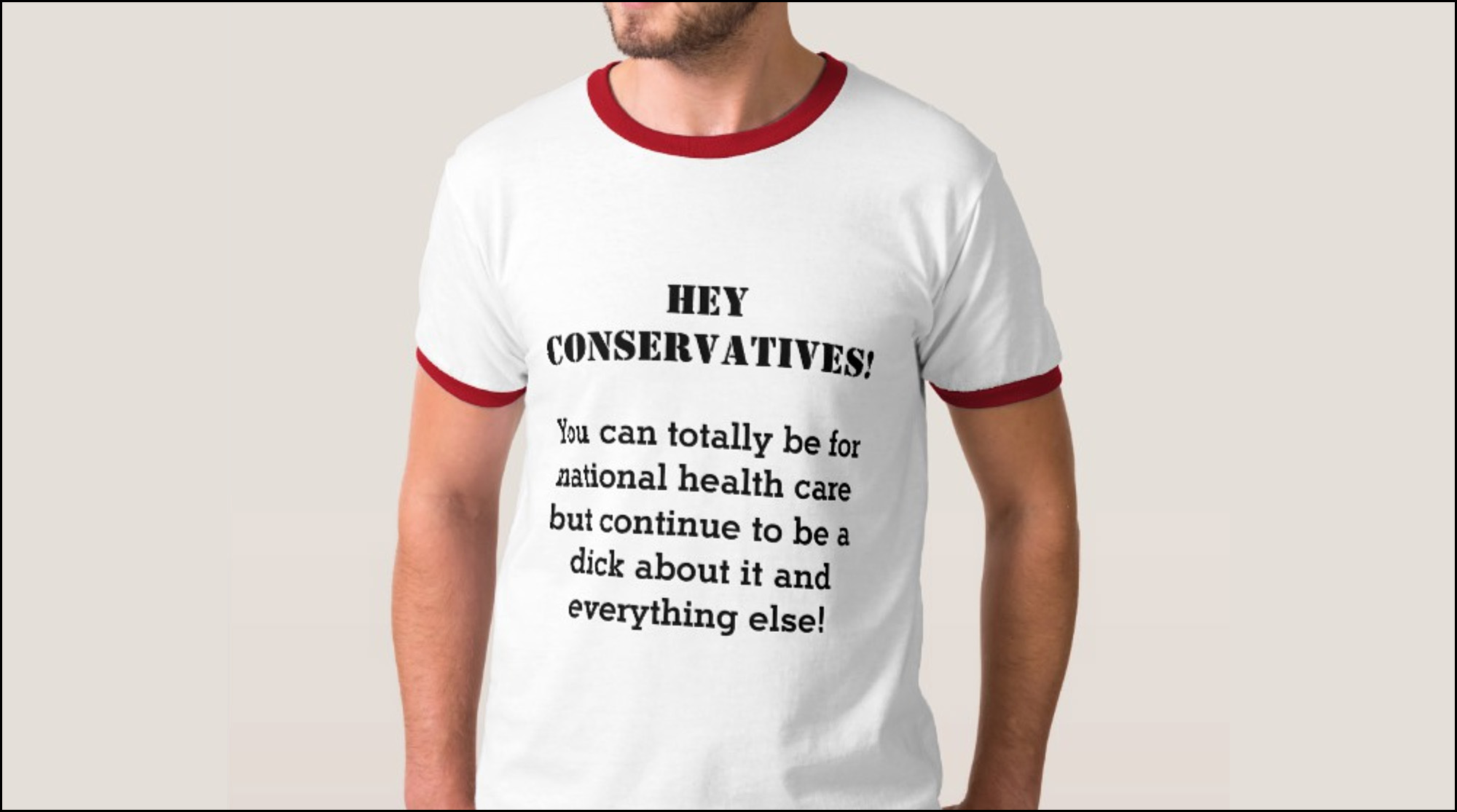
I am waiting with bated breath for one of our Monarch butterfly cocoons to begin hatching. I have high hopes of catching it in a time-lapse video, which I will post here if I manage to get it. In the meantime, here’s a checkered white butterfly, very common here in Southern California. It’s slightly shaky because I took it through my window while I was writing a blog post.
